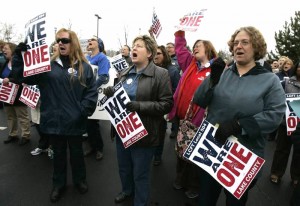
By CARL GREEN
Illinois Correspondent
Springfield, IL – The “pension theft” legislation adopted by the Illinois legislature in late 2013 died its final death this month when the state supreme court ruled unanimously that it was unconstitutional.
The ruling protects the pensions of many thousands of state employees, both working and retired, including university workers and downstate public school teachers. It leaves unsolved the dilemma of how Illinois’ government will pay for those pensions after decades of inadequate funding.
The law never went into effect. Sangamon County Circuit Judge John Belz first struck it down in November. The state then appealed to the Supreme Court.
Republican Gov. Bruce Rauner and the Democratic-led legislature – not natural partners to start with – must now deal with the wreckage of a pension system that went unsupported by governors and legislators from both parties dating back to the 1960s.
The unfunded pension liability is now about $105 billion, the largest in the nation, and it threatens to bankrupt the state government or at least ruin its good credit.
The pension legislation included higher co-payments for workers, reduced cost-of-living adjustments and later retirement ages. Supporters said it was an even-handed way to cut $160 billion in costs out of the system over 30 years and keep it solvent for all recipients.
Opponents including AFSMCE, noting that the constitution says the state will not take away promised pension benefits, called it outright theft of benefits earned in good faith.
MODEST PENSIONS
Michael Carrigan, president of the Illinois AFL-CIO, said the state’s split government must now work together to find a way to fund the pensions.
“Because most public employees aren’t eligible for Social Security, their modest pension – just $32,000 on average – is the primary source of retirement income for hundreds of thousands of Illinois families,” he said. “While workers always paid their share, politicians caused the debt by failing to make adequate contributions to the pension funds.

“Public service workers are helpers and problem-solvers by trade. With the Supreme Court’s unanimous ruling, we urge lawmakers to join us in developing a fair and constitutional solution to pension funding, and we remain ready to work with anyone of good faith to do so.”
The legislation, known as Senate Bill 1, was developed and promoted by labor supporters in the government, notably House Speaker Mike Madigan, and it was signed by former Gov. Pat Quinn, who also was the first governor in decades to make full contributions to the pension fund, although too late too avoid the huge shortfall.
One of the law’s drafters, Rep. Elaine Nekritz, a Democrat from Northbrook, near Chicago, said they were trying to avoid the very fix the state now is in.
“Our goal from the beginning of our work on pension reform has been to strike a very careful, very important balance between protecting the hard-earned investments of state workers and retirees and the equally important investments of all taxpayers in education, human and social services, health care and other vital state priorities,” she said.
“In its ruling, the Supreme Court struck down not only the law but the core of that balance. Now our already dire pension problem will get that much worse, and our options in striking that balance are limited. Our path forward from here is now more difficult, and every direction will be more painful than the balance we struck in Senate Bill 1.”
LABOR HAS A SAY
State Sen. Gary Forby, a Democrat from Benton in southern Illinois who now chairs the Senate Labor Committee, said the events show that unions need to be more involved in negotiating a plan to move forward. Unions had offered a counter-plan called the We Are One Coalition, which did not include cutting the future cost-of-living adjustments.
Said Forby: “I made a promise to the thousands of union members in my district that I would not support a pension reform plan that punishes working families. Now is the time to give labor a seat at the negotiating table so we can strike a fair balance between finding financial solvency and honoring our promises to workers.”
Rauner supports a corporate approach to the pension problem that will not likely attract much labor support – changing state law to create a new pension class of anybody hired from here on, who will be eligible only for a 401K investment plan instead of defined pension benefits.
A key figure going forward may well be Senate President John Cullerton, who had supported a plan that was more like what the unions proposed, and so was able to greet the Supreme Court decision as vindication, while also looking forward to new negotiations.
“This ruling is a victory for retirees, public employees and everyone who respects the plain language of our constitution,” he said. “That victory, however, should be balanced against the grave financial realities we will continue to face without true reforms.
“If there are to be any lasting savings in pension reform, we must face this reality within the confines of the Pension Clause. I stand ready to work with all parties to advance a real solution that adheres to the Illinois constitution.”
JUDGES’ OPINION
In an opinion representing the entire court, Republican Justice Lloyd Karmeier said the law clearly violated pension provisions of the 1970 constitution.
“Our economy is and has always been subject to fluctuations, sometimes very extreme fluctuations,” he wrote. “The law was clear that the promised benefits would therefore have to be paid and that the responsibility for providing the state’s share of the necessary funding fell squarely on the Legislature’s shoulders.
“The General Assembly may find itself in crisis, but it a crisis which other public pensions systems managed to avoid and … it is a crisis for which the General Assembly itself is largely responsible.”

